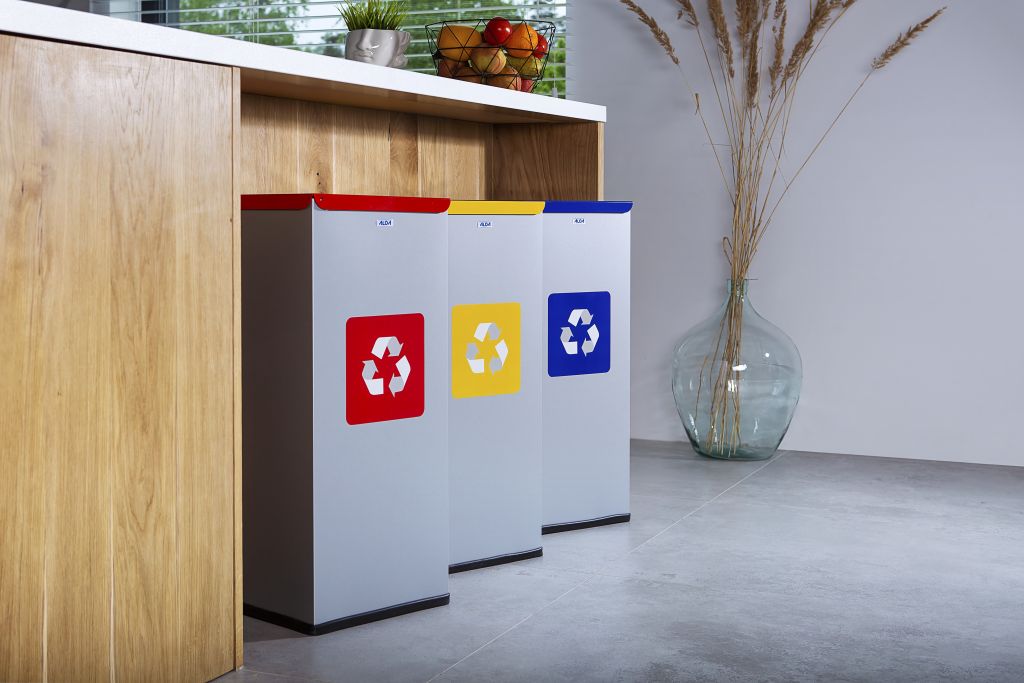What, where and how to throw away - or how to separate waste?

According to current regulations, waste separation consists of separating recyclable materials from non-recyclable waste. The rules on how to separate waste may vary slightly according to local solutions. However, there are generally five groups of waste to which the appropriate bins correspond. In the post The colours of the rubbish bins - what do they mean? We indicated how to separate rubbish according to the colours of the rubbish bins. Therefore, the question is what are the most important and common groups of waste
What are the main groups of waste we separate into?
-
Metals and plastics, which include, for example, plastic food containers, milk and juice cartons, drinks cans, tins and plastic bottles and packaging for cosmetics. Plastic toys, paint cans and medicine packaging do not belong in this group.
-
Paper includes e.g. cardboard, notebooks, books, leaflets and cartons. You should not put used tissues, paper towels or nappies in the paper bin,
-
Glass is waste such as jars, bottles and cosmetic packaging. Ceramics, mirrors and light bulbs should not be thrown in with it,
-
Biodegradable waste is waste that can be composted. This includes food scraps, peelings, cut branches and grass cuttings. No animal waste, stones or oil may be put in the bin marked 'bio',
-
Mixed waste is the waste that remains after you have separated your rubbish.
What is the other waste that can be problematic when separating waste?
We generate a certain amount of waste in our households, but if we are renovating a house or clearing up old items that have been left behind, we may come across problematic materials such as aluminium. In addition, the last few months have been marked by the fight against the coronavirus pandemic, and this generates new types of waste in our homes, such as disposable masks and gloves, and medical waste
Segregating rubbish - how do I start?
At first, segregating rubbish and understanding what and where to put it can seem like a difficult task. However, it only takes a little practice to make the process go quickly and smoothly. To get started, it is best to invest in practical waste separation bins. It is also a good idea to hang a detailed list of how to separate your rubbish in a prominent place. See the article Waste bin colours - what do they mean? for colour definitions of popular recycling bins
Waste segregation - which bins should I choose?
Choosing the right bins significantly facilitates the process of waste segregation. You should pay attention to the capacity of the bin - if it is too small, the bin will need to be emptied frequently. A bin that is too big is also not a good idea as rubbish that waits too long to be disposed of can generate an unpleasant smell. Bins should be positioned in such a way that they are easy to access, preferably hands-free.
Segregating rubbish - what colour bins should be in your home?
Usually the colour of the recycling bins suggests what should be thrown away where - the different groups of waste have their own symbolic colour. To help you make your choice, here's a list of our recycling bins by colour:
However, you can choose the colour of the container to match the interior in which it will be placed, and use an appropriate sticker to mark it. Such solution is very popular in flats or offices, therefore our offer also includes appropriate accessories - see special category we have prepared.
Segregation of waste is a value - summary of why it is worth doing it
According to the Central Statistical Office, in 2019 the statistical Pole generated 322 kg of rubbish. Waste from households has a huge impact on the progressive pollution of the environment. Therefore, waste segregation is very important for ecological reasons and, since recently, it is also mandatory under new legal regulations. Moreover, conscious waste management means that there is no need to fight unpleasant smells in the vicinity of dumpsters. We should remember that recycled materials come back to us in the form of other products, which is why it is so important to segregate rubbish and prepare it according to relevant guidelines.
